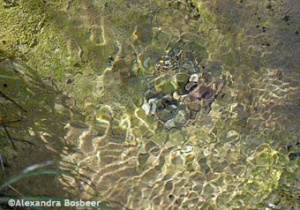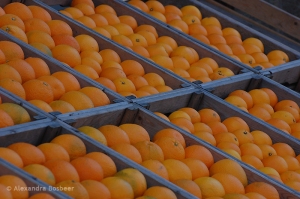Worthy water – and other services of nature
 One feature of the natural world is that it is incredibly complex. This interconnectedness plays havoc with our human desire to plan and stratify, to separate and control. The EU Water Framework Directive (WFD, 2000) gives us one example: the goal of 100% good ecological status of EU surface waters by 2015 is likely to be met by only 53% of the water bodies, and the main pressures are pollution and over-abstraction: problems that result from many minor abuses rather than a single, easily pin-pointed source.
One feature of the natural world is that it is incredibly complex. This interconnectedness plays havoc with our human desire to plan and stratify, to separate and control. The EU Water Framework Directive (WFD, 2000) gives us one example: the goal of 100% good ecological status of EU surface waters by 2015 is likely to be met by only 53% of the water bodies, and the main pressures are pollution and over-abstraction: problems that result from many minor abuses rather than a single, easily pin-pointed source.
The main type of pollution noted in the review of the WFD, is agricultural pollution: not only a diffuse source but an indication of one of the major problems in our approach to natural resources. Because we find it hard to comprehend the interconnectedness of nature, we tend to focus only on one aspect of nature at any one time. Because we are so dependent on nature, this creates the risk of overusing one service of nature while ignoring the importance of others.
 For example, in agriculture, increased productivity sounds good. Not only are we aware that people still go hungry in our world, but somehow the phrase ‘more productive’ sounds inherently good. In order to achieve higher productivity, which is simply more kilos of a plant per hectare, we often rely on technical approaches: with more fertilizer, more irrigation, more inputs, we can produce more tons of tomatoes per hectare. (This is one of the motivations also behind the increasing use of genetically modified crops.) It is the same thinking that was behind the Green Revolution: increased use of pesticides to address pest population explosions with sudden abundance of food in monocropping, and, later, horror at silent springs. There was more productivity, but at the cost of other essential ecosystem services. And our inputs don’t need to be biocides to affect ecosystem services: extraction of water for irrigation from a river or lake, industrial pollution from the mining and manufacture of fertiliser, and, ultimately, the runoff of unused fertiliser, also affect our water quality. Ignoring the innerconnectedness of nature is preventing achievement of the EU’s own objective of good quality surface waters all over Europe for the purpose of protecting the health of people drinking and bathing in that water.
For example, in agriculture, increased productivity sounds good. Not only are we aware that people still go hungry in our world, but somehow the phrase ‘more productive’ sounds inherently good. In order to achieve higher productivity, which is simply more kilos of a plant per hectare, we often rely on technical approaches: with more fertilizer, more irrigation, more inputs, we can produce more tons of tomatoes per hectare. (This is one of the motivations also behind the increasing use of genetically modified crops.) It is the same thinking that was behind the Green Revolution: increased use of pesticides to address pest population explosions with sudden abundance of food in monocropping, and, later, horror at silent springs. There was more productivity, but at the cost of other essential ecosystem services. And our inputs don’t need to be biocides to affect ecosystem services: extraction of water for irrigation from a river or lake, industrial pollution from the mining and manufacture of fertiliser, and, ultimately, the runoff of unused fertiliser, also affect our water quality. Ignoring the innerconnectedness of nature is preventing achievement of the EU’s own objective of good quality surface waters all over Europe for the purpose of protecting the health of people drinking and bathing in that water.
Although it seems reasonable to confine our consideration of our society’s effects on water to Europe, in fact we impact on other parts of the world enormously. For example, in the UK, an average household uses 150 litres per person per day. Hang on – 150 litres? Sounds like lot! And even more if one considers consumption of food and other products – each UK resident uses 4645 litres per day. In the Netherlands, it is an average of 6301 litres per person per day of global water consumption.
This global water use pertains not only to water absorbed into those tomatoes and cotton plants, but also industrial processes. And our impacts on water are both use and pollution. China, from where we in the EU buy an enormous amount of manufactured goods (€289.7 billion worth in 2012), recently released a state of the environment report outlining major pollution problems. One example: 57% of the groundwater in China is seriously polluted. Although the main responsibility lies with Chinese legislation and government, we must acknowledge our own role: Europe’s eagerness to consume items manufactured in China because they are cheap. And cheap because, indeed, the environmental (and social) safeguards required in other countries can raise prices. If we imagine what path China would have taken in its economic development if there had been no demand for its cheaper products, it becomes clear that we as consumers have been one of the forces driving environmental problems in China. And that we bear the same responsibility in other countries from where our markets demand their exports.
We must start making choices taking the range of ecosystem services into account – and considering their worth to us. It is an easy way out to suggest resolving this by exporting our demand for land and ecosystem services. In fact, we should consider treating the countries from which we import with the same consideration of environmental and social aspects as we do in our own part of the world. First must come the respect for different ecosystems.

Leave a Reply